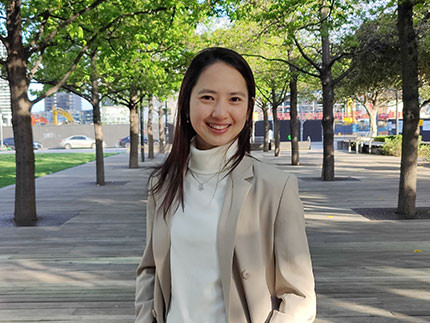Newly Appointed
Eleni Tzirita Zacharatou has been appointed Professor for Spatial Analytics and Large-Scale Data Processing (pay scale group W2, tenure track) at the Digital Engineering Faculty in a joint appointment with the Hasso Plattner Institute (HPI).
From 2019 to 2022, she was a postdoctoral researcher at TU Berlin, and from 2022 to 2025, she was an assistant professor at the IT University of Copenhagen. She earned her PhD from the École Polytechnique Fédérale de Lausanne (EPFL) in 2019, where she worked on query processing for spatial and temporal data exploration. She holds a Diploma (M. Eng). in Electrical and Computer Engineering from the National Technical University of Athens (NTUA).
Her current research aims to improve the efficiency of data analysis and support data-driven decision-making, particularly for spatial data, by developing data management tools that are aware of resource constraints, hardware capabilities, and workload characteristics. Her work was recognized with the ACM SIGMOD Best Demonstration Award in 2018.
Chitchanok Chuengsatiansup has been appointed Professor of Cybersecurity – High-Assurance Systems (pay scale group W3) at the Digital Engineering Faculty in a joint appointment with the Hasso Plattner Institute (HPI).
She obtained a bachelor's degree in Computer Engineering with first class honors from Chulalongkorn University (Thailand). She was awarded a Japanese government scholarship and completed her master's degree in Computer Science at the University of Tokyo (Japan). In 2017, she earned her PhD from Technische Universiteit Eindhoven (The Netherlands). She spent two years as a post-doctoral research at Inria and ENS de Lyon (France). From 2019 to 2024, she was a faculty member at the University of Adelaide and the University of Melbourne (Australia) respectively. Prior to joining the University of Potsdam, she was a Professor of Cybersecurity at the University of Klagenfurt (Austria).
Her research focuses on enhancing the security and efficiency of cryptosystems by considering the interplay among multiple factors such as user's performance budgets and attack vectors.
Kathrin Friedrich has been appointed Professor of Media Studies and Media Theory (pay scale group W3) at the Institute for Arts and Media, Faculty of Arts.
Previously, in her role as Professor of “Media Studies: Digital Media Culture” at the University of Bonn, she held positions as research coordinator in the research college “Sensing. The Knowledge of Sensitive Media” at the University of Potsdam and the Brandenburg Center for Media Studies (ZeM), and in the Excellence Cluster “Image Knowledge Gestaltung” at Humboldt University Berlin.
Her current research and teaching focus is on the analysis of adaptive media in artistic and cultural productions as well as life sciences. A key aspect is an examination of and refelection on the agency of tracking methods, extended reality applications, and remote sensing, as well as an investigation of their activist, creative, and subversive appropriations.



